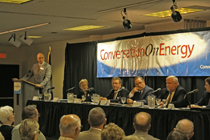Big oil speaks with Topekans to grease the gears of change

October 9, 2007
Oil and energy company ConocoPhillips visited Topeka Oct. 4 as part of its 35-city “Conversation on Energy” tour.
The event was marked by two luncheon discussions, a presentation to an International Affairs class at Washburn and a townhall meeting on energy concerns that was open to the public. The meeting, which was held at the Kansas Museum of History, was expected to draw approximately 200 attendees, but the room was filled to capacity with several people forced to sit along the back wall.
The townhall meeting consisted of a quick introduction of the five panelists and then an approximately one and a half hour question-and-answer session. The panelists speaking for ConocoPhillips were Carin Knickel, vice-president of human resources, and Merl Lindstrom, general manager of research and development. Also on the panel were Kansas Farm Bureau president Steve Baccus, Ron Hammerschmidt of the Kansas Department of Health and Environment and Stuart Lowry, Governor Sebelius’s appointee to the Kansas Energy Council.
A variety of issues and concerns arose during the session.
One man exclaimed that he was 60 years old and had been held hostage by oil companies for at least the past 35 years. When he finished, the moderator moved on to the next person, saying that he couldn’t find a question in the man’s statement.
Another man, speaking on behalf of an organization he led dedicated to trains, asked if anyone knew how much imported oil and energy goes into transportation. After a few seconds of blank looks around the room by the panelists, the moderator responded, “It seems you’ve stumped the panel.” The man continued, “Well, I’ll tell you,” and proceeded to read from an 35-year-old advertisement from “The New York Times” calling for a stop of investment in highways in favor of supporting mass transit. Mobile Oil ran the ad.
A woman cited statistics of four Ford vehicles available overseas that get 60-75 miles per gallon and sounded almost on the verge of tears as she asked what it would take to make these vehicles available in the United States.
But not everyone at the townhall meeting had a chance to speak. Washburn biology lecturer Kellis Bayless couldn’t get a question in then, but he did make several arguments during the lunch meetings for ending hydrocarbon dependency entirely, eliminating the need for gasoline, coal, natural gas and oil. As Bayless said repeatedly, “If we’re burning carbon, we’re polluting.”
Currently, hydrocarbons make up 80 percent of U.S. energy sources. ConocoPhillips is strongly advocating a slow and steady approach to energy so as not to disrupt consumption habits. Even though they were the first domestic energy company to acknowledge that greenhouse gases contribute to climate change and are committing resources to research and develop carbon sequestration, they are still pursuing unconventional sources of hydrocarbon-based fuels.
“This is about understanding issues and solutions will come if we are able to look from each other’s perspectives,” said Knickel.
Despite their different viewpoints, Bayless and Knickel were able to agree on the importance of the discussion.
“[I am] glad that ConocoPhillips was willing to engage on these issues,” said Bayless after the event.


